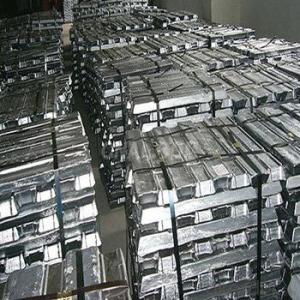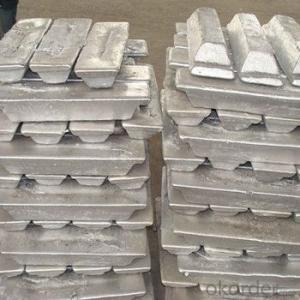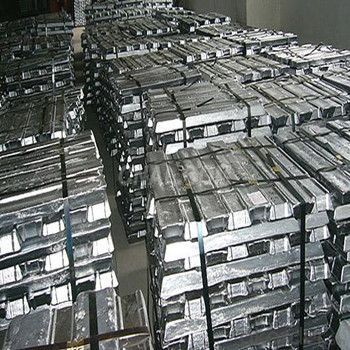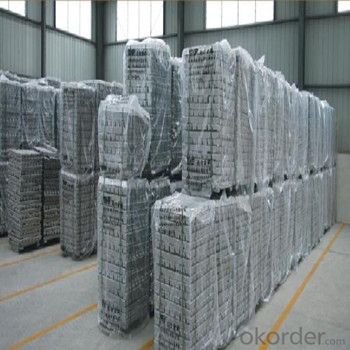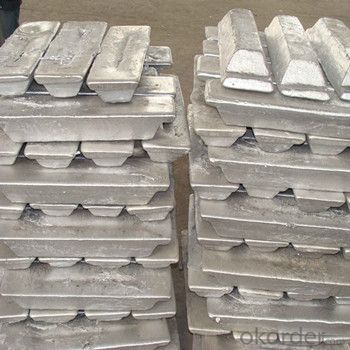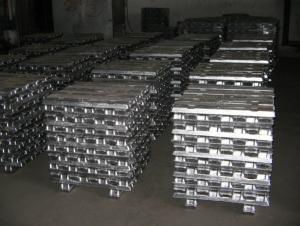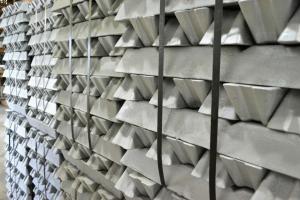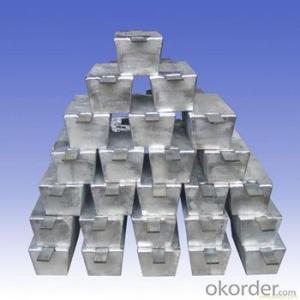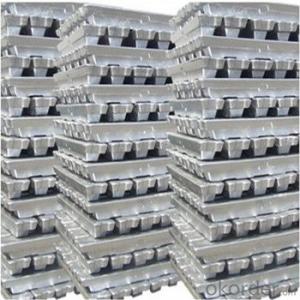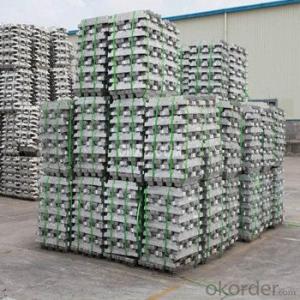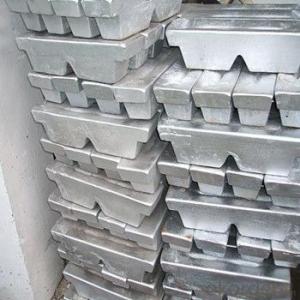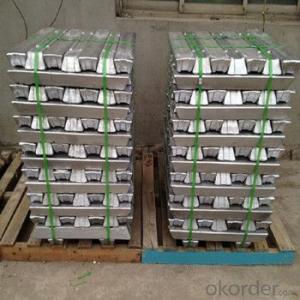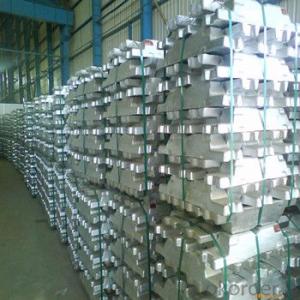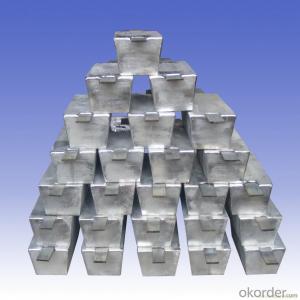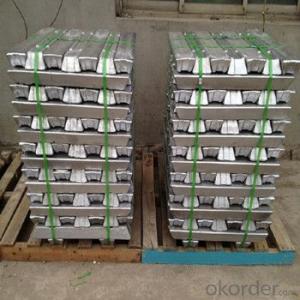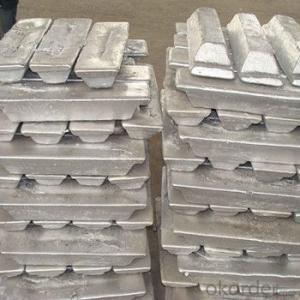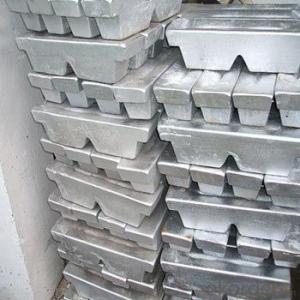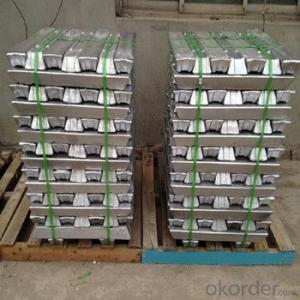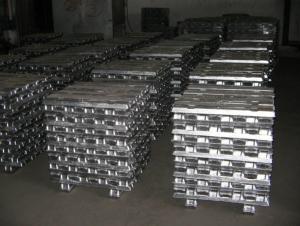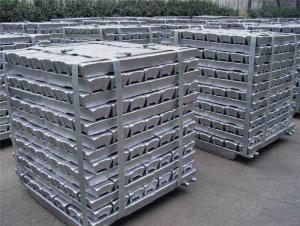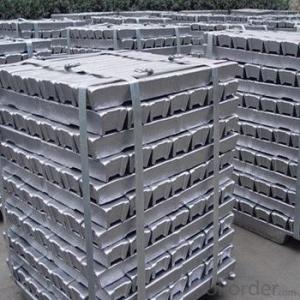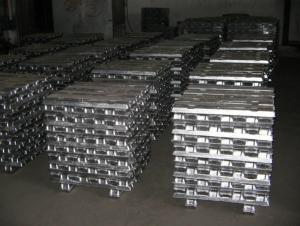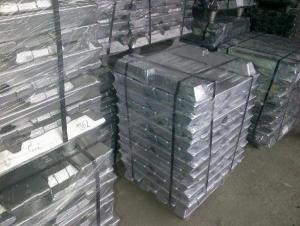Aluminium Ingot 99.7% Pure /Primary Aluminium Ingots Good Quality
- Loading Port:
- China main port
- Payment Terms:
- TT OR LC
- Min Order Qty:
- 1000 m.t.
- Supply Capability:
- 10000 m.t./month
OKorder Service Pledge
OKorder Financial Service
You Might Also Like
Pure Aluminum Ingot Used for Industry
1.Structure of Aluminum Ingot Description
A material that has been cast into a shape in order to be transported and processed easier than in an unprocessed form. An ingot is typically rectangular in shape, which allows it to be stacked. Ingots are most commonly associated with metals, with ingots of gold held in the vaults of banks and brokerages being popular images.
2.Main Features of the Aluminum Ingot
•High Purity
•High strength
•Fast melting
•Best price
•Good after-service
3. Aluminum Ingot Images
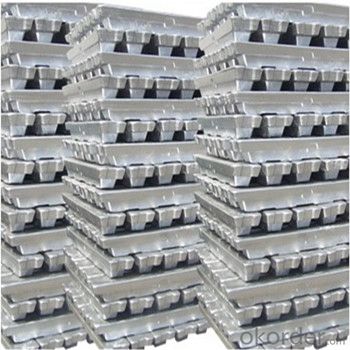
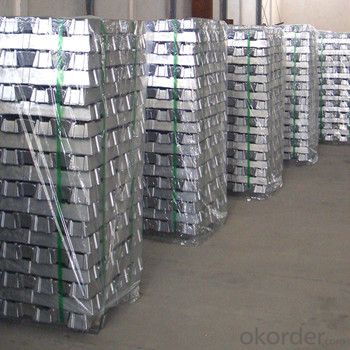
4. Aluminum Ingot Specification
Grade | Chemical Composition % | |||||||||
Al≥ | impurities ≤ | |||||||||
Si | Fe | Cu | Ga | Mg | Zn | Mn | others | Sum | ||
Al99.9 | 99.90 | 0.50 | 0.07 | 0.005 | 0.02 | 0.01 | 0.025 | - | 0.010 | 0.10 |
Al99.85 | 99.85 | 0.80 | 0.12 | 0.005 | 0.03 | 0.02 | 0.030 | - | 0.015 | 0.15 |
Al99.7 | 99.70 | 0.10 | 0.20 | 0.010 | 0.03 | 0.02 | 0.030 | - | 0.030 | 0.30 |
Al99.6 | 99.60 | 0.16 | 0.25 | 0.010 | 0.03 | 0.03 | 0.030 | - | 0.030 | 0.40 |
Al99.5 | 99.50 | 0.22 | 0.30 | 0.020 | 0.03 | 0.05 | 0.050 | - | 0.030 | 0.50 |
Al99.00 | 99.00 | 0.42 | 0.50 | 0.020 | 0.03 | 0.05 | 0.050 | - | 0.050 | 1.00 |
5.FAQ of Aluminum Ingot
We have organized several common questions for our clients,may help you sincerely:
①How about your company?
A world class manufacturer & supplier of castings forging in carbon steel and alloy steel,is one of the large-scale professional investment casting production bases in China,consisting of both casting foundry forging and machining factory. Annually more than 8000 tons Precision casting and forging parts are exported to markets in Europe,America and Japan. OEM casting and forging service available according to customer’s requirements.
②How to guarantee the quality of the products?
We have established the international advanced quality management system,every link from raw material to final product we have strict quality test;We resolutely put an end to unqualified products flowing into the market. At the same time, we will provide necessary follow-up service assurance.
③How long can we receive the product after purchase?
In the purchase of product within three working days, We will arrange the factory delivery as soon as possible. The pecific time of receiving is related to the state and position of customers.Commonly 7 to 10 working days can be served.
- Q: How are aluminum ingots used in the production of beverage cans?
- The production of beverage cans heavily relies on aluminum ingots, which have a vital role. These ingots undergo the process of melting and casting into large blocks. The blocks are further rolled into thin aluminum sheets, which are then cut into smaller pieces to form the primary structure of the can. To create the can body, the aluminum sheets are molded into cylindrical shapes and subsequently welded together. The top and bottom sections of the can, typically composed of a different aluminum alloy, are added. To preserve the taste and quality of the beverage while preventing corrosion, a protective layer is applied to the can. The utilization of aluminum ingots in beverage can production brings various advantages. Aluminum's lightweight nature facilitates easy transportation and stacking of cans. Its high malleability allows for intricate shaping and design possibilities. Additionally, aluminum's resistance to corrosion ensures the longevity of the cans and the preservation of the beverage's quality. Moreover, aluminum is a sustainable and recyclable material. By incorporating recycled aluminum into the manufacturing process, energy consumption and environmental impact are significantly reduced compared to using new aluminum. This makes aluminum cans an environmentally friendly packaging solution. In conclusion, aluminum ingots are indispensable in the production of beverage cans. They undergo a series of transformations, from melting to casting, rolling, and shaping, ultimately forming the main body of the can. Aluminum's lightweight, malleability, corrosion resistance, and recyclability make it an optimal material for beverage cans, offering convenience, durability, and environmental benefits.
- Q: How are impurities removed from aluminum ingots during production?
- Impurities are removed from aluminum ingots during production through a process called refining. The refining process typically involves two main steps: degassing and filtration. During degassing, the aluminum melt is subjected to high temperatures and low pressures. This helps in removing volatile impurities such as hydrogen, which can cause porosity and brittleness in the final product. The high temperature and low pressure conditions allow the impurities to escape as gas bubbles, which are then removed from the melt. Filtration is the next step in impurity removal. The aluminum melt is passed through a filtration system that contains ceramic filters or other porous materials. These filters are designed to trap solid impurities such as oxides, non-metallic particles, and other foreign materials. The filters have a specific pore size that allows only the molten aluminum to pass through while retaining the impurities. This filtration process helps in improving the quality of the aluminum by reducing the levels of non-metallic inclusions, which can negatively affect the mechanical properties of the final product. It also helps in controlling the grain structure and improving the overall homogeneity of the aluminum ingots. In addition to degassing and filtration, other refining techniques such as fluxing and electromagnetic stirring may also be employed depending on the specific requirements of the production process. Fluxing involves the addition of chemical compounds to the aluminum melt to facilitate the removal of impurities. Electromagnetic stirring uses electromagnetic fields to enhance the mixing and distribution of the melt, aiding in the removal of impurities. Overall, impurities are effectively removed from aluminum ingots during production through a combination of degassing, filtration, fluxing, and electromagnetic stirring processes. These refining techniques ensure that the final aluminum product meets the desired quality standards and exhibits optimal mechanical properties.
- Q: What's the difference between aluminium ingot A380 and ADC12?
- Two kinds of material are different, mainly reflected in the silicon content above, A380 is the number of ADC12 is made, day number.
- Q: What are the advantages of using recycled aluminum ingots?
- There are multiple benefits to utilizing recycled aluminum ingots: 1. Environmental advantages: The utilization of recycled aluminum ingots requires significantly less energy than extracting it from its raw state. By incorporating recycled aluminum ingots, we can decrease energy consumption and greenhouse gas emissions. Furthermore, recycling aluminum aids in conserving natural resources and reducing the necessity for mining, which can have adverse environmental consequences. 2. Cost efficiency: Over the long term, the use of recycled aluminum ingots can be cost-effective. Recycling aluminum necessitates less energy and resources in comparison to manufacturing new aluminum, resulting in lower production costs. These cost savings can be passed on to consumers, making recycled aluminum products more affordable. 3. Waste reduction: Through aluminum recycling, we can divert a substantial amount of waste from landfills. Aluminum is a highly recyclable material, and its recycling decreases the need for disposal and the associated expenses. Additionally, recycling aluminum prevents the accumulation of aluminum waste, which can take centuries to decompose. 4. Energy conservation: The production of aluminum from recycled ingots requires only a fraction of the energy required for primary production. Recycling aluminum saves up to 95% of the energy used in primary production, making it an energy-efficient choice. This energy conservation also leads to a reduction in carbon emissions. 5. Positive economic impact: The recycling industry plays a significant role in job creation and economic growth. By utilizing recycled aluminum ingots, we support the recycling industry and contribute to local economies. Additionally, the use of recycled aluminum reduces dependence on imported raw materials, which can have economic benefits for countries. 6. Versatility and quality: Recycled aluminum ingots can be utilized to manufacture a wide range of products, similar to primary aluminum. The quality of recycled aluminum is comparable to that of primary aluminum, making it suitable for various applications. Its versatility allows for the creation of high-quality, durable, and dependable products. In conclusion, the use of recycled aluminum ingots offers numerous advantages, including environmental benefits, cost efficiency, waste reduction, energy conservation, positive economic impact, and the ability to produce high-quality products. It is an exceptional choice for individuals and businesses seeking to minimize their environmental impact and contribute to a more sustainable future.
- Q: How much is a ton of aluminium ingot on the market?
- Anshan executive director and Secretary of the board of directors pay Kyrgyzstan will accept the inquiry said that Liaoning province is not affected by the snowstorm blowing, the Anshan Iron and steel production line is operating normally, although from Shanxi coal supply tensions, but from Heilongjiang normal supply, so the company can make proper deployment, to meet the needs. However, Fu Ji will say that the snow storm caused some traffic in the sales market to be confused and could not be paid on time.
- Q: What is the melting point of aluminum ingots?
- Aluminum ingots typically reach a melting point of around 660 degrees Celsius, equivalent to 1220 degrees Fahrenheit.
- Q: How is aluminum ingot produced?
- Aluminum ingots are produced through a process called smelting, where alumina (aluminum oxide) is extracted from bauxite ore and then converted into molten aluminum. This molten aluminum is then poured into molds and cooled down to form solid ingots, which are later used as raw material in various industries.
- Q: Can aluminum ingots be anodized?
- Aluminum ingots are capable of undergoing anodization. Anodization, an electrochemical procedure, yields a safeguarding oxide layer on the exterior of aluminum. This technique can be employed on aluminum ingots, sheets, or any other manifestations. Anodization boasts numerous advantages, including heightened resistance against corrosion, enhanced durability, and the potential to introduce color onto the surface. Moreover, the anodized layer enriches the aesthetic appeal of the aluminum and facilitates superior adhesion of paints or dyes. In summary, the anodization of aluminum ingots is a prevalent practice across diverse industries to augment both the properties and appearance of the metal.
- Q: How are aluminum ingots used in the production of electrical conductors?
- Aluminum ingots play a crucial role in the production of electrical conductors. These ingots are first melted down and then cast into various shapes, such as wires, rods, or strips, depending on the specific application. One of the main reasons aluminum is used in the production of electrical conductors is its excellent electrical conductivity. Aluminum has approximately 61% of the electrical conductivity of copper, making it a viable alternative in electrical applications. Additionally, aluminum is much lighter than copper, which brings benefits in terms of transportation and installation costs. To manufacture electrical conductors, aluminum ingots are typically processed through a series of steps. First, the ingots are heated and extruded to form long, continuous aluminum rods or wires. These rods or wires are then drawn through a series of dies to reduce their diameter and increase their length. This process is known as wire drawing and helps to refine the aluminum's microstructure, increasing its electrical conductivity. After wire drawing, the aluminum rods or wires are annealed to relieve any stress and improve their mechanical properties. Subsequently, the aluminum conductors may be further processed by applying a thin layer of insulation, such as a polymer or enamel coating, to protect against electrical short circuits and corrosion. Once the aluminum conductors are ready, they can be used in a wide range of electrical applications. These include power transmission and distribution systems, where aluminum conductors are commonly used for overhead lines. Aluminum conductors are also employed in electrical cables, such as building wiring or automotive wiring harnesses. In summary, aluminum ingots are an essential component in the production of electrical conductors. Through processes like extrusion, wire drawing, and insulation application, aluminum ingots are transformed into highly conductive and reliable components used in various electrical applications.
- Q: How are aluminum ingots used in the production of power transmission towers?
- Due to their lightweight and high strength properties, aluminum ingots are utilized in the production of power transmission towers. These ingots are melted to create aluminum alloys, which are then cast into various tower components such as lattice structures, cross arms, and braces. The lightweight nature of aluminum makes it an ideal material for power transmission towers as it reduces the overall weight of the structure, resulting in easier and more cost-effective transportation and installation. This is particularly advantageous in challenging terrains or remote locations. Furthermore, aluminum alloys offer excellent corrosion resistance, ensuring the durability and longevity of power transmission towers. They can withstand harsh weather conditions, including extreme temperatures, humidity, and exposure to saltwater or chemicals. Moreover, aluminum ingots are highly malleable, allowing for easy fabrication and customization of tower components to meet specific design requirements. This flexibility enables engineers to create intricate lattice structures that can support heavy loads while maintaining stability. In addition, aluminum's electrical conductivity is another crucial factor in its use for power transmission towers. It facilitates efficient electricity transmission with minimal power loss, ensuring the reliability and efficiency of the power grid. In summary, aluminum ingots play a vital role in the production of power transmission towers by providing lightweight, corrosion-resistant, and electrically conductive materials. Their use contributes to the construction of reliable, durable, and cost-effective infrastructure for transmitting electricity over long distances.
Send your message to us
Aluminium Ingot 99.7% Pure /Primary Aluminium Ingots Good Quality
- Loading Port:
- China main port
- Payment Terms:
- TT OR LC
- Min Order Qty:
- 1000 m.t.
- Supply Capability:
- 10000 m.t./month
OKorder Service Pledge
OKorder Financial Service
Similar products
Hot products
Hot Searches
Related keywords
